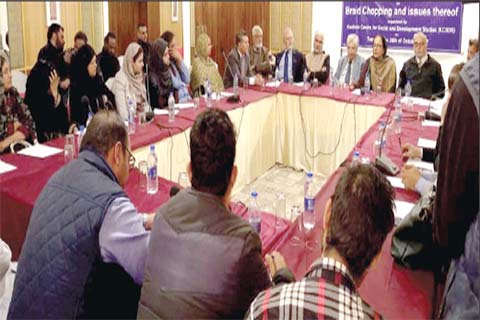A civil society group on Tuesday termed braid chopping incidents as “planned” saying the tactic is aimed to divert attention from political issues like Article 35-A and “create chaos in Kashmir.”
Members of civil society were speaking at a round table conference held by Kashmir Centre For Social and Development Studies ( KCSDS) here. They rejected government’s claim that braid chopping is related to “mass hysteria”.
Chairperson, KCSDS, Hameedah Nayeem said “braid chopping incidents started occurring in Kashmir at a time when the chorus against proposed abrogation of Article 35-A was at its peak.”
“Government’s theory that braid chopping is a mass hysteria is completely debunked. Such evil tactics and designs have been adopted at a time when Article 35-A had snowballed into a major issue. The government was worried and wanted to change the discourse,” she said.
“It is important to defy and defeat these attempts and bring back focus on issues such as Article 35-A,” she added.
Civil society member, Syed Shakeel Qalander said KCSDS will probe braid chopping at the civil societal level and put forth relevant facts soon. “Braid chopping is being instigated to create fear psychosis among people, especially the youth in Kashmir,” he said.
“We are in touch with a known psychiatrist of the Valley who has examined many victims of braid chopping. The doctor will be putting together a report soon which will be analysed,” Qalander said.
Political analyst Siddiq Wahid seconded him saying that a thorough probe must be conducted by the civil society to “unravel the mystery”. Wahid recounted that mysterious incidents such as braid chopping have also been reported from conflict zones such as East Timor, Uganda and Sri Lanka.
“Based on media reportage, social, psychological, anthropological and other aspects, we need to investigate the matter on a societal level. Most of such cases taken place in conflict zones across the world have been where minorities have been fighting for their rights and women became the victims. Such incidents have historically lasted for one to three months,” Wahid said.
Commenting on the varying interpretations of braid chopping, known child specialist Dr Altaf Hussain said “some psychiatrist” in Kashmir are “misleading” people by their interpretations of these incidents. “In medical profession, the basic ethic is that you don’t have to lie. Some shortsighted youthful psychiatrist is trivializing the issue by calling it a mass hysteria. A senior psychiatrist has already contradicted this young psychiatrist,” Dr Altaf said.
Justice (Retd) Hasnain Masoodi said government is maintaining a “criminal silence” on braid chopping. “This increases the level of suspicion among people about the handiwork of external elements,” he said adding incidents at Pahalgam, Kulgam and Rainawari, where attackers were allegedly “shielded” and force was used upon people, has raised doubts about “role of state” in braid chopping.
“This is not hysteria but happening in an organised way to attack the psyche. The political heads are also downplaying these incidents,” Masoodi said.
Academician Qurat-ul-Ain said firsthand account of victims of braid chopping in media is a “concrete evidence that physical assault has been made on these women before their braids being chopped.”
Former bureaucrat Muhammad Shafi Pandit said “rabeeta committees’ should be formed to address the problem. “ We should involve local heads who can coordinate with the police for the probe,” Pandit said.
At the end of the RTC, a joint resolution was passed deciding that the civil society groups has “debunked” the mass hysteria theory of the government. It also said that expert opinion will be sought and underlined that utmost caution be exercised while maintaining vigil against braid chopping.
Braid chopping aimed to change political discourse in Kashmir: Civil Society






